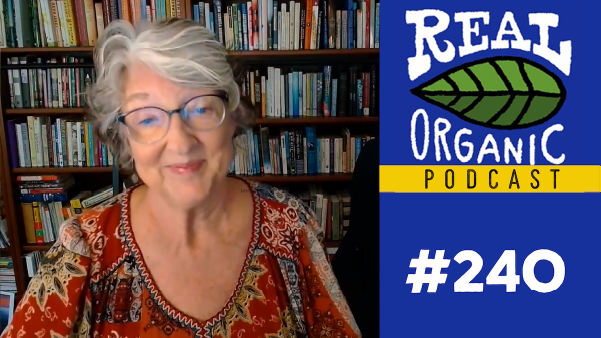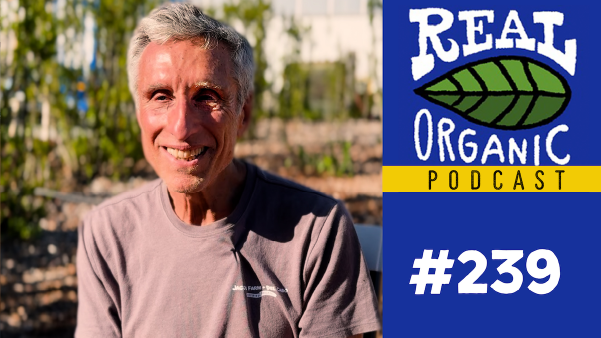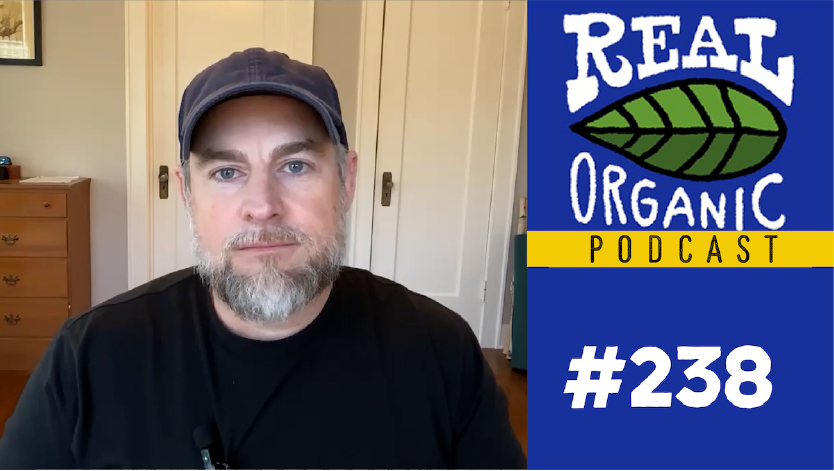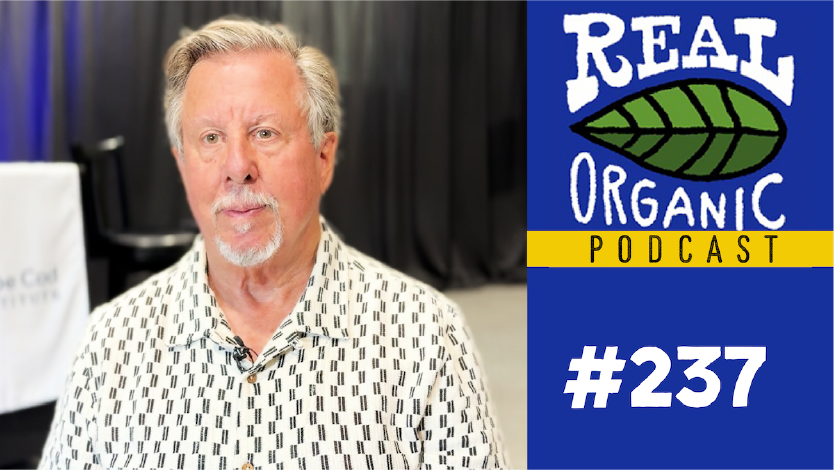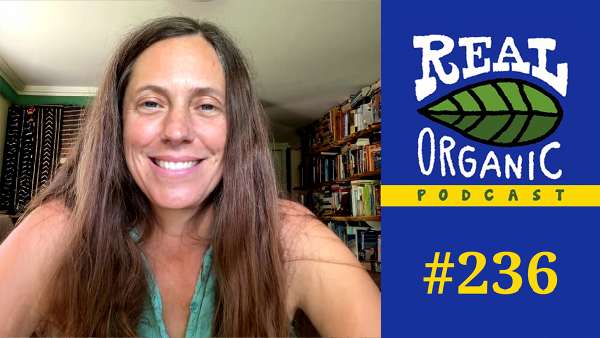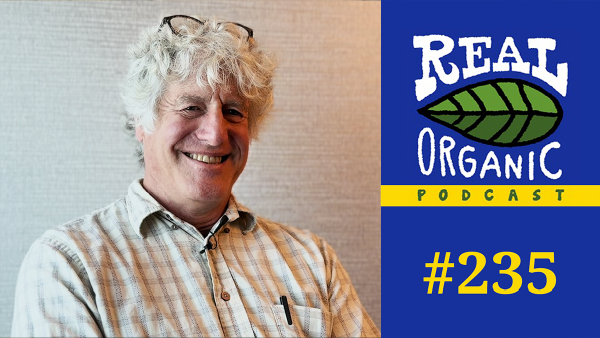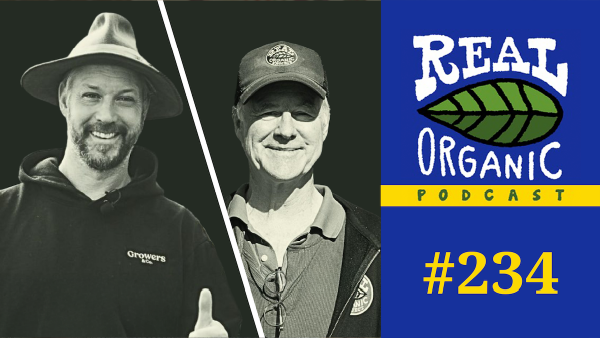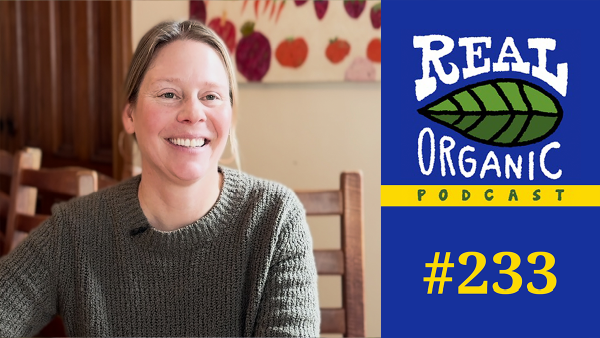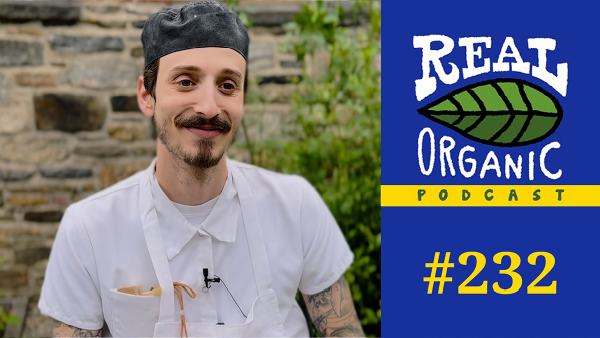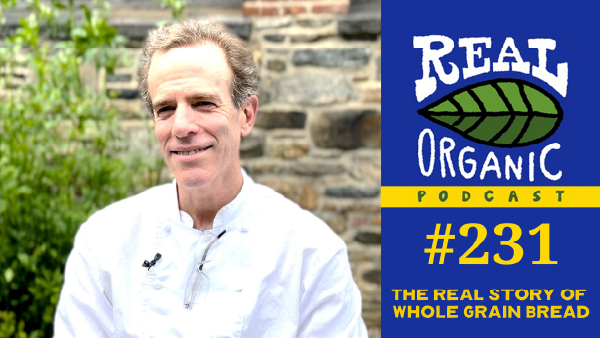Episode #001
All About Real Organic Project + The Real Organic Podcast
Welcome! You can subscribe and download episodes of our show through your favorite podcast app.
You can also subscribe to receive the video version of each episode on our YouTube channel.
Our conversation has been edited and condensed for clarity.
Linley Dixon : Welcome to Episode One of the Real Organic Podcast. I’m Linley Dixon, co-director of the Real Organic Project. We have the most incredible list of guests lined up this season, including authors, journalists, climate and soil scientists, organic farmers, chefs, and politicians. We’re really excited for you to hear their thoughts about the effects of food and agriculture on our planet and on our communities.
This first episode is going to be a little different. We want to introduce you to our Real Organic movement so that you can understand why we exist and why we created an add-on food label to incentivize the growth of real organic practices – and what real organic practices even are! We want you to understand what has changed in the organic industry in the United States and why farmers like us have joined forces to do something about it.
And how that journey has brought us allies, including former Vice President Al Gore and Senator Patrick Leahy; activists like Paul Hawken, Bill McKibben, Vandana Shiva; local food chefs like Alice Waters and Dan Barber; and social justice focused farmers like Leah Penniman, Karen Washington, and Onika Abraham.
So to do that, we’re going to play a 15 minute piece first. It covers a glimpse into our story, and it features many of the voices who have joined the Real Organic Project on its short three-year journey. Afterwards, you’ll hear a conversation between myself and my co-director Dave Chapman. And we’ll explain more about the first season of our podcast and how the interviews we’ll be sharing came to be.
All of our podcasts are also available as videos, including this one; many include beautiful footage of the farmers on their land. So if you ever want to see our guests in person, please visit our website and you can watch the video versions of any episode. Okay, let’s get started with Episode One.
Paul Muller of Full Belly Farm: We, by our choices have the power to make or destroy the world. We have to wake up.
Javier Zamora of JSM Organics: You know, perhaps if we don’t start talking about it and get together on how to save the core values of what organic is, or was at the beginning, we’ll probably lose it. If you look the other way, things change. So you got to be very vigilant and see what’s going on out there. It’s sleeping out of our hands.
Dave Chapman of Longwind Farm and Real Organic Project: Over 99% of the milk meat and eggs in America comes from CAFOs. And I think that most people don’t know about this. Can you tell people what a CAFO is?
Emily Oakley of Three Springs Farm: Confined animal feeding operation, where thousands of animals are raised in a very small area.
Francis Thicke of Radiance Dairy: Basically the common usage for the term is animals in confinement.
Glenn Elzinga of Alderspring Ranch: And then I go past vast feed lots, you know, that have anywhere from 50,000 to a hundred thousand head eating fecal dust mixed with their combined corn ration or some kind of concentrate ration that’s made to make them gain weight and maximize productivity.
And it’s wrong. It’s just wrong.
Joan Gussow, Professor of Nutrition: It’s really brutal to the animals and to the people around them.
Emily Oakley: In our area. It’s chickens. The newest houses that have been built within the last couple of years have 50,000 birds and a barn. So that’s up to a million and a half birds on that little parcel of land.
Glenn Elzinga: It’s not responsible. It’s not stewardship. It’s not husbandry by any stretch of the imagination to have animals in those kind of conditions.
Linley Dixon of Adobe House Farm and Real Organic Project: And the real shock was when we started to realize that concentrated animal feeding operations were getting certified as organic, organic means healthy soil and pasture.
Anaïs Beddard of Lady Moon Farms: Because when you’re buying organic eggs right now, you’re not getting pastured eggs and you really have to search hard to find out. There’s no other way to know what you’re getting is what you think you’re buying. It’s crazy.
JM Fortier of La Ferme des Quatre Temps: And nobody sees it. We don’t feel it the way it’s, it’s built up. You know, we never kind of understand the impact of when we buy these meats at the, of the grocery stores and the lack of alternatives. And it’s just, it’s absolutely terrible.
Andy Smith of The Milkhouse Dairy and Creamery: There’s, there’s huge shift underway towards large confinement, organic-in-name-only operations in the Western United States that milk, you know, five, 10, 15,000 cows. And somehow we’re supposed to believe that they meet the 30% dry matter intake from pasture rule, which they don’t. And now the, the same thing is happening in the organic market that’s happened in the conventional market, where all the family scale farms are being forced out of business by these large corporate entities.
Rosie Burroughs of Burroughs Family Farm: We are closing our California Cloverleaf Farms dairy, which was our first organic dairy, because we have not been paid a price that keeps us in a sustainable mode. Right now we’re very broken hearted about having to close the doors to our dairy.
Francis Thicke: If the CAFOs went out of business, the quote-unquote “organic” CAFOs, went out of business because the were enforced, ut definitely would make a more lucrative market for small family farmers that were doing it right.
John Ikerd, Professor of Agricultural Economics: I’ve said that CAFOs are kind of the epitome of everything that’s wrong with industrial agriculture. You can see it there. And the big corporations that control them? That’s concentration of market power, concentration of corporate power. as well.
Ben Dobson of Stone House Farm: We have an NOP, an NOSB, I even think our OMRI boards are all compromised with industry representatives who are dead set on the expansion of corporate organic – and the backbone of this is this so-called “organic” grain that’s imported.
Anne Ross, Director of International Policy at Cornucopia Institute: The U S doesn’t produce enough organic grain to meet demand. So we’ve seen a rise in imports and several years ago organic grain farmers in the US started to notice that cheaper imports from suspicious areas in the world, where there been known problems, started to really flood the market here. The Washington Post in may of 2017 documented three huge vessel loads of grain that came into the US and was not legitimately organic.
Peter Whoriskey, Washington Post Journalist: Along the way, it magically became organic grain. The documents were changed. In doing that, I think that price roughly doubled. And it was a whole ship of grain, so there’s a lot of money to be made.
Anne Ross: Combine the fact that you’re getting cheap imported grain that is often going to large agribusinesses who are also not adhering to the spirit of the law – and certainly not the letter, it’s nearly impossible for many of the real organic farmers to compete. And of course, consumers aren’t getting what they paid for.
Paul Muller: There’s real organic, and then there’s organic by default. We have seen a dilution over organic principles, you know, and it points entirely to why hydroponic production being labeled as organic is ridiculous.
Hugh Kent of King Grove Organic Farm: They’re saying, go ahead, go out there and compact this land and laser level it, which makes it basically unsuitable for farming, and then cover it in plastic. And they put plastic pots out there and say we’re going to let you call that organic.
Jessie Buie of Ole Brook Organics: Instead of looking at the quality of the organic product, the profit motive came in. And I think that’s what kind of made the big change and why the board lost the fight for hydroponics being organic.
Eliot Coleman of Four Season Farm: What we got was we got more food on the shelves certified as organic, but we didn’t get more organic farming.
Dave Chapman: And the result of it is that the whole economic landscape is changing. So if you want a blueberry or a strawberry or tomato or a pepper or some greens that is organic and you don’t want it to be hydroponic, you no longer have any way of going in the store and telling what you’re buying.
And what’s happening in the store is more and more and more of this certified organic production of those crops is becoming hydroponic. And it’s going to continue.
Hugh Kent: That’s a huge problem for people like me because I’m allowing that hydroponic, that cheap hydroponic system, that disposable plastic farms to be labeled as organic in the same way that this farm is labeled as organic creates a situation where on the shelf, the consumers have no idea. They both say USDA organic, and they may have different prices, but they have no idea what it is that they’re buying or how it was grown because the standards are so lax and they’ve been eroded so much. And there’s just so much lack of integrity now in the USDA’s administration of the National Organic Program,
Hannah Smith-Brubaker of Village Acres Farm and Foodshed: I don’t understand how any enterprise that isn’t building soil could possibly be certified organic.
Former Vice President Al Gore of Caney Fork Farms: The life forms in the soil itself are absolutely critical to good regenerative, real organic farming.
David Montgomery, Geologist/Author: How you get those things to dance together, biologically into forms that actually can nourish a living organism. That’s the magic that happens in the soil. And that’s really where I think if we can get people to understand that and think about that and recognize the importance of it, you can start to ground why it’s so important – in terms of how we grow our food is just as important as what we eat.
John Ikerd: Unless we build and rebuild soil fertility, we will never achieve long-term success in cultivation generationally.
Linley Dixon: And so the organic farms that are really struggling across the country are the places where the organic standards are weak: organic dairy, organic grain, organic pastured poultry, soil-grown organic tomatoes. All of these organic farmers are competing under a different definition of what organic is. And they’re being driven out of business.
Zach Wolf of Caney Fork Farms: Grain, coming this country and being certified as organic that’s not actually organic? That’s a big deal. Confinement dairies getting certified [organic] and not actually putting animals out on pasture? That’s a big deal. Hydroponics, soil-less growing systems being certified as organic? I mean the hydroponic thing alone is enough I think for most people to be like, “well.. wake up! What does organic even mean at this point?”
Leah Penniman of Soul Fire Farm: When organic can actually mean, you know, these huge mega corporations that are draining aquifers, exploiting worker,s and torturing animals, then that word actually had doesn’t have meaning anymore. And so to reclaim language and infuse it with our deep sense of truth and our ethical compass is crucial.
(Former) Vermont Lt. Governor David Zuckerman of Full Moon Farm:
In the long run. If the term organic loses its integrity, then we all will suffer and lose.
Linley Dixon:
When corporations started changing what could be certified as organic, farmers protested. And when they were ignored, they came together and they formed the Real Organic Project to be able to communicate once again to the consumers how they farm.
Anaïs Beddard:
The organic farmers who helped create and shape the organic movement as we know it do not want to give up on the name organic. It means something, and it’s not hydroponics, it’s not key CAFOs. It might have the USDA certified logo on it, but we know that it’s not really organic.
Eliot Coleman: And so the only system of agriculture that is going to feed human beings in perpetuity is one that is creating its fertility from the things you’re doing. It works, it really works! We’re feeding the world, or at least our little part of it here.
Jessie Buie: It would facilitate what we’re trying to do if you would just label these products as for what they are, and then let the consumer decide. That’s how the market works. The consumer will look at what it is and then decide. And then I think all of us could get along better.
Dave Chapman: If we can have integrity in the marketplace and sell food and label it accordingly, I think we will win. I think the consumers will, if they are given an honest choice and say, this is Real Organic, and this is hydro-USDA-organic, I think the Real Organic is going to do just fine in the sales. There’s not a big movement saying we want hydroponic food. Just like, there’s not a big movement saying we want our milk to come from confinement operations.
If you had a milk carton with a picture of a cow in a feed lot, and then you had one of the cows in the pasture, and you said “these are honest pictures” – which one are people going to buy? They’re going to buy the one that has the cow in the pasture and they’re gonna pay more for it. And they should.
But what’s happening right now is that they’re buying milk from the cow in the feed lot, but it’s got a picture of the cow in the pasture on it.
Francis Thicke: The Real Organic Project can alert consumers to dairy products that are produced from grass-based farms, produced according to the Real Organic Standards. And so I think that we can accomplish that.
Paul Muller: And the Real Organic Project to me is a grassroots effort of farmers who have instigated and grown organic, and much of the industry has ridden on the back of now and moved away from, and they’re not paying attention to it.
It’s time to bring the purposes and the work and all the beliefs of what organic is back to the forefront and create a farmer-led movement. A consumer collaboration where there are supporters of Real Organic Project looking for the Real Organic Label as a way to blunt the direction that this whole organic industry is going in, and bring back some of the fundamental principles. We have to fight for it.
Hugh Kent: It’s the first opportunity I’ve seen where farmers are getting together and trying to explain to the public what’s going on and offering an alternative.
Emily Oakley: As more and more farmers start using this new label and consumers started seeing it. It will have viable change that we’re hoping it will because it gives consumers and farmers a chance to distinguish between growing practices. And I think that they do care for enough of them do to make a difference.
Javier Zamora: It just takes a few people to make a change. We just have to stay together. Be smart about it. Little by little, a grou like this can change a bigger part of the organic movement.
Dave Chapman: Linley Dixon. And I are going to have a conversation about the real organic project and the symposium that we put together in January of 2021, and the many interviews that we did to make up that symposium and those interviews are now being released as podcasts. So Linley here
Linley Dixon: We are. We had a lot of fun. We learned a lot.
Dave Chapman: Was it fantastic to talk to what? Over 70 people?
Linley Dixon: We took 70 hours of footage condensed and it into about 10 for the [2nd Annual Real Organic] Symposium. So this podcast is a chance for everybody to get to hear the entire interview that we ended up editing down for the Symposium.
Dave Chapman: That’s right. Even more than 70 hours, because there were farmer interviews on top of the 70, we did just for the symposium.
Linley Dixon: So we ended up here because COVID came and our in-person symposium, that was to be at Dartmouth, it was canceled two to three weeks before it was supposed to go live. And so we had to regroup.
Dave Chapman: We had done so much work to get ready for that symposium. And then we were in free fall, like everybody in the world. Everybody had a life plan for that period. One of the things that I saw in that shift, I think we had an amazing symposium plan for Dartmouth. An in-person one for that April of 2020. But one of the things that we saw is that even though we lost the ability to have people come together in a room, which is so valuable, is that we gained the opportunity to be able to talk to people anywhere in the world and engage them in the subjects that we considered really important. So suddenly we could talk to Vandana Shiva in India, and we could talk to Walter Jehne and Stuart Hill in Australia. And we could talk to Nora Taleb in Germany and, and to Paul Holmbeck in Denmark. It was pretty great, right?
Linley Dixon: That was so fun when we started building out this guest list and we thought, oh my goodness, look, who’s coming. Look who’s saying yes. You know, because they had time too, to join us for an hour, whereas before they would have had to travel. So it really did open the guest list to pretty much everybody and I’m so proud of who we put together. Yeah.
Dave Chapman: And it was wonderful because they were so willing to do it. You know, so many of them were tracking, as many of them had already come out in public supportive of what Real Organic Project’s doing, all of them cared about the subjects we were talking about. So could you describe how we broke the symposium out into subject matter?
Linley Dixon: Yeah. There are so many connections into why we’re doing what we’re doing and why it matters that the farms that are losing market share, it’s more than just that farm, the loss of that farm. It’s the loss of something bigger than that. And we started to connect the dots. So there were five sessions that the farms practices that are real organic, that we were trying to promote. We’re also connected to soil health and soil health was connected to climate. And because the healthy soil was there, the nutrition of the food was too, and that all of this is joined together by creating awareness and education; a part of a greater movement than the individual farm. And so that ended up becoming our five sessions.
Dave Chapman: Yeah. I think it’s important to say the first session was “how did we get here?” And a lot of my journey through this has been to actually understand where we are, what’s going on. I know when I began trying to bring the National Organic Program to greater integrity, I thought it was a much smaller issue. I thought in the beginning, we were really just talking about one company that had wrongly gotten certified as organic for hydroponic production. And I thought it was a bad thing, but relatively small. And I thought that we could get it changed by petitions and reaching out to the National Organic Program. And I was very wrong. I was very wrong. That would be easy to change because I didn’t realize who we were up against, what companies we were up against.
Dave Chapman: I didn’t realize the extent of, of the hydroponic invasion of organic, which is the dollar amount of a dollar amount by, by their own claim. It’s, it’s over a billion dollars of certified hydroponic production. That’s being, you know, certified as organic. But I also, as I got into it, and as I started to go to these meetings of the advisory board, the National Organic Standards Board to petition them to please get it together. And actually the National Organic Standards Board had already years before recommended that hydroponic not be certified as organic. And I started to meet people like you, I’d never met you before. And I started to meet a whole community, and I realized that these people had been working on this for years. I had not, I’d just been farming and they’d been trying to fight the loss of integrity that was getting greater and greater – and not just around hydroponics, but also around CAFOs, around concentrated animal feeding operations, the big confinement of livestock of dairy and meat and eggs, and also around fraud, grain fraud in particular, and also around the failure to actually enforce the rules for dairy.
And I was like, oh my God, this isn’t small, this is huge! And I grew up, you know, farming in Vermont. Well, that’s not true, I grew up farming in Pennsylvania, but I became an organic farmer in Vermont. And organic farming in Vermont is completely what I thought organic was. And these things of CAFOs and hydroponics wasn’t happening in Vermont. I didn’t know anything about it. And as I started to see the national and international scene, I realized we had a serious problem on our hands.
Linley Dixon: And we were trying to take the next step too, between all of those farms that were suffering because of the weakening of the USDA organic standards and educate the consumers about it, bring them along too, because we need each other. The farms need the eaters to exist. And the eaters need to, you know, be able to find a way to authentically purchase the right food and not be fooled by the marketing.
Dave Chapman: I remember talking to my cousin and he was so proud of what a deal he had gotten on this huge jar of salsa. It was like $2.99 and I’m thinking, you know, these aren’t the values that I know my cousin wants to support. So I started talking to him about it and he said, well, I don’t trust any of the labels anymore because you know, they all say that they’re doing this and then they just charge above it. And so I’d prefer to just get the cheaper one that’s not trying to trick me. So he felt just the whole shopping experience, he was being tricked and there was so much marketing dollars behind it.
Linley Dixon: And we were seeing that too, right. We were seeing the picture of the animals on pasture. And we knew the reality behind where that food was coming from the same thing with the tomatoes. You know, if you, if you ask any hydroponic grower, at least the big ones they’ll deny that they’re growing hydroponically. So we just, we’d lost honesty and transparency in the marketplace. And because of that, the eaters are smart. You know, they’re, they don’t want to be fooled. They don’t want to pay more for the same product. And so we were driving people away from the organic label because they were starting to realize that they were getting fooled. And so it was a way to kind of pull everybody back and say, wait a minute here, there’s all these farms that are still really legitimately organic, and there’s this beautiful law behind them that we just need to enforce. And so it was kind of a way to bring the granite community back together and they eaters with us.
Dave Chapman: Yeah, that’s right. It is a good law. And it’s not being enforced. And I think people are right that it’s very hard to tell what’s going on because we’re, we’re really dealing with professionals who are very good at confusing us and misleading us. And we see it over and over. One of the things that for me, inspired the symposium, a friend years ago asked me, he said, well, it’s good person who cares about food, cares about the climate, cares about government with integrity. He said, I don’t understand why hydroponic wouldn’t be called organic if they’re using natural inputs. And I said, well, that’s a good question. I’m not even sure I have the language to answer that. I mean, I do have language, but I want to dive deeper into it. And that deeper dive was for me, the real inspiration for Session Two, which is soil health.
And why does soil health matter and really, to really get it, I mean, Session Two describe what soil health is, but to really understand why it matters you have to go to sessions three and four, which is climate and nutrition. And, you know, we knew that there were connections, strong connections between how we farmed and and the climate and the environment and the water, the air. We knew that there were strong connections between how we farmed in the nutrition of the food. That, that is the VIF core principle of organic farming. Is that how you treat the soil very much affects the nutrition of the food and your health and the animals health and the plant health. But it was such a privilege for me to get to talk to so many people who were, you know, had spent their lives, studying little, little parts of this. And, you know, when I think of the people that we had in the soil health, like, like Stewart hill and Walter Yana, and I, I, there just so many it was such a privilege to talk to them. And when we went to climb
Linley Dixon: Stuart and his farming mites, right? Yeah, yes.
Dave Chapman: Stuart was, was right. The how the, how the small social animals will we’ll be farming the microbes for their own diet and had been doing this for a very long time. In climate. We talked to Al gore, which was for me quite a privilege to be interviewing Al gore whose farm is certified with a real organic project. And we got to talk with bill McKibben, who is not that distant a neighbor here in Vermont, and who has done such amazing work
Linley Dixon: Climate leaders that already knew that the connection between climate and agriculture was so intimate. So it was so obvious to them, to why they would be invited to, to talk about what real organic is. You know, they’ve already had that connection, soil, health and climate, not everybody does
Dave Chapman: Though. Yeah. Yeah. Walter Jehne again, was for me, one of the great teachers explaining these connections to me you know, and, and, and then nutrition, right. And talking to Joan [inaudible] and mark Schatzker and Fred prevents these people who are just so eloquent, who has spent years studying, studying nutrition and seeing the connection. Oh, and, and bit clay and David Montgomery, and the connection between how the food is grown and, and what the nutrition of the food is for us and what the health consequences are really interesting conversations.
Linley Dixon: Yeah. And book clay in particular, just her, her voice, these fetching fungi, you know, they’re out in the grocery store, finding what they need and bringing it back to what the plant needs and bringing it back to it. I think she she’s so vibrant when she tells the stories of what’s going on under the soil. And then when she came to Dartmouth for our first symposium, she put this big picture of a brain over the entire soil surface, as if it’s just this organism, that’s all interconnected and bringing it all together for the plant to actually be healthy. And then ultimately for us to be healthy when we eat the plant.
Dave Chapman: Yeah. And she and her husband, David Montgomery are soon to have a book coming out exactly about that subject, that you are, what you ate ate. It’s really, it’s really great, which again, is the foundational principles of organic agriculture. What we’ve seen is that organic has actually become successful in the marketplace, that that principle is being obscured and, and, and often lost. And people coming to organic see organic entirely as less pesticides. And which is great, very important. We, we celebrate that and we celebrate that people come because they don’t want to eat poison on their food, but organic was always intended as far more than that. It was intended on food. That’s not just not bad for you, but food that is actually good for you. And it’s, it’s a big difference. And that is what organic agriculture was intended. When it began as a political movement in the thirties and forties, and it, it came as a reaction as a response to the increasing chemical agriculture, which was becoming a huge at that point, but has, has become massive since then.
Linley Dixon: And I think that a lot of that was lost when the law started to only look at the final product instead of the farm and the systems. And so the national organic program somehow interpreted the law to say, well, if the final product is clean, clean and not what’s in it, right. But what’s, what’s left off of it, which is pesticides, but they’re not even looking about, you know, what, what is in the nutrition of that final product. So anyway, instead, and the real organic project is we’ve gone through our certification instead of just looking at the final product and saying, is this USDA organic or real organic putting a label on it? We’re looking at the farm and saying, how, how do the farm systems play out into our idea of what real organic is? And the entire farm needs to comply with that definition, as opposed to just the single product. And that’s a very different way. And I think it goes back to the origins of the organic movement, because we’re, we’re ultimately trying to farm in a way that’s organic, not just produce a final product because we realize how much our whole farm, it connects to the groundwater and the, you know, the health of the air and the soils and everything around the community.
Dave Chapman: Yeah. Yeah. It’s, it’s interesting. I think, you know, it’s like that Supreme court justice Susan when asked what was pornography, and he said, I know it when I see it. I think we actually know it real organic is when we see it, but it’s very hard to come up with a rule and set of standards that are verifiable over a wide range to get to that. And those standards when you do do them are easily twisted. That’s, that’s what session one is about is, you know, how do we have a national organic program that we are proud of and that we can support. And that is, is giving people what they want to buy. And one of my favorite favorite examples of this is if we w it’s common, now that we have these large confinement, dairy operation certifying their, their, their herd and their milk as organic and all of the organic farmers, all of the organic community goes, that’s not organic.
Dave Chapman: So how do you tell that? One way I said is if you just put a picture of, of that cow standing on that feed lot on that cement feedlot and put that on the, on the carton of the milk, right on the cover of the milk carton. And then you put a picture of Francis ticky or of a jacket, an laser of their cow, standing out in a field of pasture, and you showed people those two milk cartons, and you said, well, which one would you like to buy? Which one do you think is really organic? Everybody would choose the one with the cow in the pasture, and you say, yeah, but Alan’s costs more. They say, that’s fine. Take my money. That’s what I want. So I think that in the end, and I think that’s true for hydroponics too. If you showed a picture of you see blueberries growing in the soil, it’s so beautiful there.
Dave Chapman: And, and you showed a picture of a Driscoll’s, you know, totally green versus plastic. This is plastic is useless. They’re just plastic farms. Right. And you showed that again, put that on the cover of the, of the blueberry container and said, which one do you want to buy? Everyone’s going to pick, you can cans, beautiful thing, growing in this grass. And I can say, yeah, but that one costs more. Yeah, take my money. It’s worth it. That’s what I want to eat. And that I think is what the real organic project is about. Because right now people go to the store, they can’t tell the pictures are not honest. I’ve seen beautiful video of a hydroponic place, and it’s kind of soft focus from the waist down. So you can’t see the pots and they have these nice young people, you know, who looked like kind of very clean cut hippies, and no they’re just models, right? This is not what it really looks like at the, at that production facility. So how do we get past the fraud? How do we get they, these companies? And they are multinational corporations. They know what people want, they know how to appeal to them. And what they do is they make their farms look as if they’re real organic, but they are,
Linley Dixon: It was incredible to see the effect in traveling for the real organic project, how these farms, that, that lack of transparency was having on the farms. So, you know, we got the story of the milk house, and they’re a young dairy that maybe you’ve got 50 cows or something like that, maybe even less, but they were dropped by horizon, you know, a few days before I visited. And it’s because they can get away with putting, you know, horizon can still put the picture of what looks like a milk house farm. And, and the majority of their milk is coming from mega dairies that are mostly feedlot cattle because they’re milk three or four times a day, and you can’t get them out to pasture. And back far enough away from the milk house three or four times, you know, to, to come in for milking.
Linley Dixon: So the pasture, you know, you’re going to get further and further away throughout the season. And it just becomes a point when you have that many cows, you physically can’t do it. So they just stay in the feedlots. And that’s not the picture that they’re putting on the curtain side has a real effect on these farms. And we were able to tell their stories. So we had these amazing you know, movement leaders that became part of the symposium. And we were juxtapositioning them next to the farmers that were really going through something, losing markets having trouble communicating to their customers, why pastor is so important, why healthy soil is so important. And so that, that became a way to elevate their voices, to put them next to some of these leaders. And it was really fun to get, to see some of the farmers and the, you know, the farms that I visited, you know, right there next to some of our stars.
Dave Chapman: Yeah. So one thing that was for me growing in my understanding in the last five years was the introduction of race as a topic in the organic community. And I will say that there, there are definitely people in their organic community who do not welcome that. I say, well, wait, you know, that might be important, but what does that have to do with how our food is grown with with, with, with, with everything. And and I think that what I see is that in the last five years race has become a part of the conversation for every community in America. And I feel like, well, my God, if NASCAR’s talking about race, it seems to me that organic ought to be talking about race too. And so that was something that we did bring into the symposium consciously, and we had tremendous interviews and they weren’t just about race, the interviews weren’t just about race, but we had tremendous interviews with people that certainly included conversations about race was Leah Penniman. And with Karen Washington and with Jennifer Taylor and Jesse buoy. And Onika Abraham, you got to do a lot of those interviews. What was it like?
Linley Dixon: I particularly remember Canuck talking about how he had to overcome personally the trauma on the land and feel that it was okay for him to go back and love the land and work the land. And so his story you know, I wonder how common that is for other black people to feel like, you know, where’s my place here. And I remember Karen Washington really stressing the importance of sharing those stories with each other because there’s, there’s too much of a lack of understanding of, of what, well, the baggage that all of us carry around with us. And in order to relate to anyone, you need to be open to sharing your story and you need to listen to other people’s stories. And that was really the theme of her, of her talk is all of these race problems are because we don’t listen and we don’t share our stories.
Dave Chapman: Yeah. So one of the things that was kind of exciting was to talk to some of the big vision people, Paul Hawkin, Allan savory, Seth Goden Kat Taylor, Paul home back and lace, or like people who are looking at this from a very systemic point of view, instead of from the point of view of one farm, you know, or one crop, but they’re looking at like, what’s, what’s going on? What, what are we doing? And how do we do it better? How do we create the world? We want to live in, maybe the world we need to live in, if we’re to survive instead of the world that these corporations want us to live in, because it’s more profitable for them.
Linley Dixon: To that, you know, corporations, aren’t always the problem too. You know, we had like Bronner and Patagonia representatives from those places where they really can be part of the solution. But I remember when you were interviewing David Grinspoon and he told the story about the hole in the ozone and how they denied it, people producing those compounds denied it, denied it, denied it until they found the replacement chemicals that no longer cause the problems. And then they were all in favor of promoting it. And so it’s always interesting to me, you know, I think, I think it’s one thing to just say, well, you know, we’re never going to shop at Walmart again, but I think the next generation is asking, well, how do we get Walmart to change? You know, and if that’s even possible. So I like that we interviewed some people that are part of corporations that are doing good. And that’s, that’s always a question to me is, is, can you, can you actually change them? Or is there some, you know, a limit to how big, or how out of control you know, a corporation gets before they can really create real change because ultimately then they end up having to talk down about something, some other part of what they’re still trying to sell. So can they really come to our side and, you know, create change across the entire organization or just a token change. And that’s kind of one of the themes.
Dave Chapman: I think that actually might be the theme of next year symposium. It’s such an important question. I will say that the corporations you mentioned are all privately held family corporations. They’re not public corporations. Yeah. And I don’t actually know of examples of public corporations that really stand with us. It’s I think we’re seeing this, this debate play out right now in the regenerative movement. And you know, all along multinational corporations have now said we’re regenerative, right? Well, Walmart bear Monsanto McDonald’s, you know, organic ever. No, no, no, no, but general mills, which has an organic branch, but now, now they’re much more excited about being regenerative. What does that mean? And, and I am enormously suspicious, not of the pioneers of the regenerative agriculture movement, but of these corporations that just as they did with, with organic and Walmart is the biggest organic vendor in America.
Dave Chapman: For sure. Right. So if you want to know where most organic food is sold, it’s sold in Walmart, not real organic. I don’t think there’s at the moment, any real organic sold in Walmart. So I think it’s a very interesting question. Whether a big corporation can in fact stand for something like this, which is not going to be cheaper. That’s the reason that that the organic label is so debased is because there was money to be made and the corporations came in and they do what they do, which is we’ll make it cheaper and we’ll make it more uniform and we’ll make it. So it’s all the same. It’s everything that Alice Waters said in our thing about fast food culture. These are the values of fast food culture. And I’m not saying that something is bad because it’s inexpensive, but I’m saying by and large, as Michael Olson, rather brilliantly said, cheap food.
Dave Chapman: Isn’t, it’s not cheaper. It’s cheaper at the cash register and that’s the only place. And the rest of the day, you’ll pay in your pay and you’ll pay for what you got such a good deal on at the, at the checkout counter. So if we start to take that on, and I think that the symposium did, but if we, if we go a little further with it, maybe next year, about the ways in which economics play out, you had a great interview with John [inaudible]. He’s like my favorite economists, certainly my favorite ag economist. And he talked about this, you know very grippingly
Linley Dixon: On Alan Lewis, two talks about the realities of why we can’t find shelf space for choice for a tomato. And yet you’ve got a million choices in the process style, but how, you know, and that’s a really, that was an eye-opener for me, because I didn’t realize why produce was different from everything else, but there’s this shrink thing. And so if you want to understand why it’s so difficult to find real organic produce, really good produce in the, in the co-ops and the grocery stores to listen to that interview, because there’s a whole world of, of algorithms and systems that just keep the small farmers out and the real, the real organic farmers too, that actually were in the wholesale markets and are starting to lose that shelf space. So he was really educational for me.
Dave Chapman: Yeah. I think that’s an important thing for people to realize that the real organic project is not just created to protect farmers. It’s created to protect everybody who wants to buy that food, because we are literally losing the choice in the market right now, it’s falling off the shelf, you know, blueberries, like those that come from cane Grove are not going to be something you can buy in the store. You’re going to buy something else. It’s going to be hydroponic. If it’s a blueberry it’s, it’s, it’s coming very quickly. And so if you’re a same as true for milk, there still are some small dairies, even at places like horizon, but it’s quite possible. They’re just being kept for the photo opportunity. I don’t know, but I do know that they’re, they’re being put out of the business in droves right now because the price keeps dropping as the production becomes more industrial, lower quality, but, but we can make a lot of it and we can, we can ship it anywhere. And
Linley Dixon: It’s only because we’ve lost that transparency. If we hadn’t lost that, I don’t think that would exist. Cause we, we know people want to buy the other and we’ve got all these private labels now. So it makes it really difficult to figure out where the milk’s coming from.
Dave Chapman: You know, there’s a, there’s a, there’s a famous thing called a thousand true fans, a man named Kevin Kelly came up with it. And he said in the, in the age of the internet, artists, for example, can make a living. All they need is a thousand true fans. And those people who really are all in and will support their work. So we got thinking, well, how about if we had a thousand real fans and how many people does it take to change the world, right? How many organic activists does it take to change a light bulb? And we thought, you know, if we had a thousand real fans, that would actually be quite powerful. I know we’re, we’re, we’re talking about a country with whatever 350 million people. And I’m sure there’s 4 million people in America who really care about what we care about, but how do we connect everybody?
Dave Chapman: How do we weave all those threads into a fabric that has impact? And they can start to change the food system. And it will be changed ultimately by a small number growing into a bigger number. So the idea was, well, let’s see if we can build a thousand real fans. And it’s a wonderful thing. We asked people, if you would donate a hundred dollars a year to help us coordinate this and say that you would like to do something, not just read something, but do something and help us in some way to coordinate, to spread the word, to, to help people understand. That’s what the real fans are about. Sometimes that work well, we’ve
Linley Dixon: Got them writing their legislators and going into their stores and telling their produce buyers. Well, do you know about real organic project? Do you know about like which of the produce that you’re carrying is hydroponic? What about the meat and eggs and milk? Is that coming from a KFO? So just trying to raise awareness at the stores and then of course telling your friends and forwarding weekly letters that we send out and, you know, just trying to build a community about this concept behind the concept of real organic and, and it’s growing, we’ve got about 300 members and we need, did
Dave Chapman: You tell people about them? Could you tell people about the knitting group?
Linley Dixon: We have the, yeah, we’ve got a knitting group. That’s writing letters to Amish farmers so that they can be aware of the movement to, and become a real organic project certified farm. So there’s lots of ways to help us out and we want that list to keep growing. So, so that’s the ask behind the podcast too. If you’re inspired, please go to our website and join a thousand real fans.
Dave Chapman: So that’s what the symposium about, and that’s what the real organic projects about. And I hope that you have curiosity about what we’re doing and a desire to maybe dive in a little deeper and you know, maybe you’re you’re cooking breakfast or something. I don’t mean to distract you, but you might like to listen to some of these people. We’re going to start releasing the podcast probably two week for the next 30 or 40 weeks close to a year. And I hope that you’ll come and join us and dive into some of the, some of the complexity of the conversation. It’s not simple. People who try and make this simple are, are not telling the truth. These are not simple ideas, not simple conversations. And that’s why it’s important because if we just rely on a label, even on the real organic label in the end, it’s not going to work out. We need to become informed. Yeah. How much did you learn, Dave? I learned so much all the time. It’s and it’s, it’s so exciting. So yeah, I’m really, I have a great job. All right, well, thank you, Lily. Thanks Dave.
Linley Dixon: Thank you for listening to the real organic podcast. We hope that you will subscribe. Tell your friends about it and leave us a review on iTunes, Google play Spotify, or wherever you found us. A video version of this interview, as well as the full transcript with links related to today’s conversation can be found realorganicproject dot org forward slash episode one. Please join us next time for an interview with Paul Hawken, the author of Drawdown. to find a Real Organic farm near you visit realorganicprojec.org/farms


